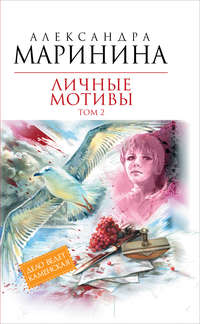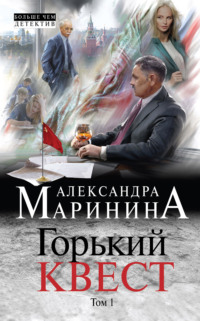
Полная версия
The Stylist
The first one was a nice guy, who managed his duties well but whose normal male ambition got in the way of staying in a job with no career prospects. Solovyov paid a more than generous wage and threw in use of his car, but it turned out that the man had taken the job for a place to live. As soon as he had an opportunity to buy his own apartment, he quit. The publishers found him his second assistant – they sent over a young man who worked in their warehouse. He didn’t last very long – he was sticky-fingered and dumb besides, forgetting to do half the things Solovyov told him. This was the third. The publishers had found him, too, apologizing all the while for the unsuccessful previous candidate and promising that the young one would be fine. His name was Andrei.
Solovyov was wary of him. In the last two years he had learned the full measure of his own vulnerability, involved with his inability to control the assistant and the need to rely on him completely. While the first attempt had been more or less successful, the second was a failure. Therefore, he decided to start by finding out why Andrei took the job.
“How old are you?” he asked Andrei when they met. “Twenty-five.”
“Do you have a family?”
“Parents. I’m not married yet.”
“Do you live with them?”
“No, I have my own place.”
“Education?”
“High school.”
“Army?”
“Yes.”
“Tell me, Andrei, what do you need this job for? It’s not a career path.”
“I won’t have a career anywhere,” he said with an easy smile. “That’s not my character. You have to be aggressive, pushy, quick. I’m not like that.”
“You’ll have to live here with me,” Solovyov warned.
“Yes, I know. They told me.”
“What else did they say?”
“That I’ll have to drive, be able to cook decently, not drink, and be precise and careful with your work. To do what I’m told and not forget anything.”
“And do you think you can manage that?”
“I hope so. My mother says I should have been born a girl.” Andrei’s eyeglasses lent him a serious and businesslike air. Solovyov thought that he had no choice anyway. So now the new assistant had been with him two weeks. There had been no problems as yet, but Solovyov, taught by experience, did not let up his vigilance. Andrei had gone into town that morning to buy food for the birthday party. He should have been back, Solovyov thought irritably, it was getting dark. He was afraid of being alone in the dark.
The sound of a car came through the window, the car door slammed, and the front door opened. Solovyov was in his study on the first floor and could hear his assistant’s every footstep. Would he start unloading the car first or have the sense to come in and report?
Andrei had the sense to report, and Solovyov’s irritation subsided.
“Good evening. I’m sorry for the delay.”
Ah, so he realizes he’s late. That was good.
“What happened?” Solovyov asked as indifferently as he could. He didn’t want the boy to see that he had been upset.
“They didn’t have some of the hors-d’oeuvres you had ordered, and I had to wait while they made them up.”
“What, they made them specially for you?”
“No, specially for you,” Andrei replied with a smile. “I gave the department director your book and explained that it was your birthday. Her husband is a big fan of Eastern Best Seller, and she gladly took care of the order.”
“Where did you get the book? From my shelves?”
“No, I bought it along the way.”
“What for?”
“Just in case. And it did come in handy.”
The fellow had brains. And he wasn’t pushy, he bought the book himself, even though he could have asked Solovyov for a copy, he wouldn’t have refused.
“In any case, I managed to get everything you wanted. Food and drink. I’ll unload the car and then we’ll have dinner. Or would you rather eat first?”
“No, no. Go ahead. I’m not very hungry.”
Andrei left, and Solovyov returned to his translation. The book was due in two weeks, in mid-April, and he was right on schedule, but Solovyov did not like leaving things for the last minute and preferred to finish earlier than the publisher’s deadline, to have time to go over the manuscript one last time for the final touches.
After dinner, Solovyov settled down in the living room in front of the television set.
“Andrei!” he exclaimed. “I forgot to remind you this morning about the masseur. ”
“I called him,” the assistant replied. “You had told me about it two days ago. He’ll be here tomorrow morning at ten.” “Thanks,” Solovyov mumbled in relief.
The masseur came every other day at the same time, five p.m. But that might not be a good time tomorrow, since guests might have arrived by then. Solovyov had not invited anyone for a specific time, and anyone who wanted to come would be dropping in at any hour during the day. He did not want to miss his massage, because he felt like a new man afterward. Well, well, the boy was not forgetful, another point for him.
That night he had trouble falling asleep. For some reason he was worried about tomorrow. But why? There was nothing special, a day like any other. It wasn’t the first or last birthday he’d ever have. So why so upset? As if he were expecting disaster.
His bedroom was on the first floor, and Andrei’s room was on the second, right above him. Solovyov could see the light coming from Andrei’s window. The assistant was not asleep and that was upsetting, too. It was after one a.m., why wasn’t the lad sleepy? If he was what he tried to appear to be, not ambitious and without any other interests or occupation besides his work for Solovyov, he should sleep soundly at night. Or did he suffer from insomnia too? Why? Guilty conscience? Spiritual suffering? Lord, he was getting ridiculous!
The light went out on the second floor at last, and Solovyov calmed down. He had drifted off when he heard footsteps. Someone was carefully going down the ramp from the second floor. Someone! Why, who else could it be but Andrei? Solovyov opened his eyes, but there was no light coming from the window. Why didn’t he put on the light if he needed to go downstairs? Why was he walking around in the dark? His heart was thudding and his ears rang.
The steps got closer and, even though they were very cautious and quiet, Solovyov could hear them. They thundered in his ears. He couldn’t stand it.
“Andrei!” he called out, turning on the lamp over his head-board.
The door was flung open instantly. Andrei was on the doorstep wearing only his shorts. Solovyov noticed that his assistant was barefoot.
“Excuse me for disturbing you,” he said, embarrassed. “I thought you were asleep and I tried not to make any noise.”
“I’m not asleep,” Solovyov said dryly. “What happened? Why are you wandering around the house?”
“You know, I was falling asleep when I remembered that I hadn’t put the butter in the fridge. Was I really making so much noise?”
“No, but my hearing is very good,” Solovyov grumbled. “Put away the butter and go to bed.”
He put out the light and curled up under the covers. He was ashamed of himself. Like a baby, honestly, afraid of the slightest sound. He had to stop. He decided once and for all that there was nothing to be afraid of, there was nothing of value in the house and robbers wouldn’t come here. It was ridiculous being such a coward. He had to get hold of himself.
* * *Contrary to his expectation, he woke up in a marvelous mood. The sun was shining and it was his birthday. He didn’t care that he was an invalid. It was holiday and he would celebrate.
Solovyov decided not to get up until the masseur came, since he would have to get undressed and get back into bed anyway. The masseur came at ten on the dot, as promised, and forty minutes later Solovyov felt his skin tingling and his weakened back muscles feeling stronger. After the massage, he had a bath and shampoo, shaved, put on a gray silk shirt with a beautiful dark gray pullover, and went to breakfast.
The first thing he saw was a huge bouquet in the middle of the table. Andrei was smiling, and Solovyov saw that he was holding a large gift.
“Happy birthday, Mr. Solovyov!” his assistant said, handing him the present. “I wish you all the best and hope that you spend the day so that you’ll enjoy looking back on it the whole year.”
Solovyov’s spirits soared, he felt so easy and happy, the night fears forgotten and gone, it seemed, forever. He was glad that Andrei shared his mood and was ready to celebrate.
He untied the package and almost gasped in amazement. It was lovely landscape, stylized in the traditional manner of Japanese prints. Solovyov had never considered himself an art connoisseur and always evaluated art on the simple test of whether or not he liked it. He liked this painting at first sight. He simply fell in love with it.
“Thank you, Andrei,” he said warmly. “Thank you so much. It’s a wonderful gift and a wonderful painting. Where do you think it would look best? I’d like to hang it in the study, since I spend most of my time in there, and it will give me pleasure to look at it.”
“All right,” Andrei said. “We’ll hang the painting in your study after breakfast. But now, a surprise.”
“Another one?”
“Since it’s already eleven thirty, instead of a light breakfast, we’ll have a real European lunch.”
And with those words the assistant took out a huge pizza from the oven and put it on the table. Just think, it was his favorite, Quatro staggione, the four seasons. How did he know?
“First a Caesar salad with tomatoes and cheese, then the pizza, then coffee with strudel. And without rushing, with feeling. We’ll stretch out the pleasure for at least an hour.”
“Great,” said Solovyov, suddenly realizing how hungry he was.
What an amusing young man! How subtly he sensed his mood and his tastes. Solovyov really enjoyed Italian cuisine, and Andrei must have been told that by the Sherkhan people. A long time ago, when they were just beginning to work together, they took a trip around Italy. Solovyov was with his wife, Svetlana, Kirill Esipov had his girl friend, and Grisha Avtayev, his son. What a wonderful time they had! It was very touching that they had gone to the trouble of telling the new assistant so much about him. What good people they were. They appreciated quality work.
The salad was authentic, and that was another pleasant surprise.
“Did you make the salad yourself?” he asked, helping himself to a second portion.
“Of course. Out of a cookbook. Is something wrong?”
“No, no, it’s perfect. Marvelous. What about the pizza?”
“The pizza is from the restaurant. I’m not good with the dough. Mr. Solovyov, Esipov called this morning to find out what time was convenient for you. I took the liberty of telling him any time after five. But if that doesn’t suit you, I’ll call them back.”
“It’s fine. Let them come after five. Did anyone else call?”
“No one.”
For a moment, Solovyov was sad. There used to be a time when his phone started ringing early in the morning on his birthday. People called to wish him the best and to find out what time the meal was, and asking if they could bring a friend. And now…
He chased away the sad thoughts. Everything’s fine, Solovyov, don’t sulk, people don’t like sorrow and you can’t blame them for that. Why don’t you think back how many times you called an old friend last year with birthday greetings? You’re the one who moved and changed phone numbers, and even though Igor was still at the old apartment, you couldn’t expect him to take the trouble to pass on your new number to callers. He lived in a permanent party state, and whoever was closest picked up the phone. All they say is that you don’t live there anymore.
“Let’s finish breakfast and go for a walk,” he ordered. “The weather is fine. It’s a shame to stay indoors on a day like this.”
* * *But his mood changed abruptly during the walk. And he couldn’t say why. No one insulted him or upset him, but he felt depressed. It had been a mistake to want a celebration. A lonely invalid should lead a quiet hermit’s life instead of trying to be like people who are healthy and independent.
Andrei was pushing his wheelchair along the paved path that circled Daydream Estates. The spring air was warm and delicious, and Solovyov took deep breaths with pleasure, but nevertheless he wanted to go back home, to his translations. It was only in his work that he felt independent and self-reliant and even more importantly, irreplaceable.
Solovyov was about to ask Andrei to turn back, but he changed his mind. Why let the boy know that his mood had soured. He had tried so hard to make this a special day, had bought him a present and cooked a great lunch. He would be saddened to see that his efforts had been in vain. “What’s the matter with me?” thought Solovyov. “What do I care if his feelings are hurt? He’s not a friend or relative, he works for me. And his feelings shouldn’t effect me in the least.”
“It’s probably time to go back,” he said calmly, so as not to reveal his sudden irritation. “I have work to do today.”
“Of course, Mr. Solovyov. As you wish,” Andrei replied, turning the wheelchair around.
At home Solovyov went straight to work and his depression and irritation quickly disappeared. He plunged into ideographs, reading them easily and turning them into polished, refined phrases in Russian, at the same time respecting the mastery with which the author developed the plot. He was distracted from his work by the sound of a car stopping outside, and he looked up at the clock in surprise. Was it already five o’clock and he had not noticed the time fly by? It was only a little after three. The doorbell rang, he heard Andrei’s hurried steps and the click of the lock. Solovyov heard a woman’s voice that did not seem familiar. It must be somebody lost and looking for a neighbor’s house, thought Solovyov. However, a minute later the assistant was in his study.
“Mr. Solovyov, you have a guest.”
Solovyov rolled out to the living room in his wheelchair. In the middle of the room stood a blonde woman in narrow trousers that hugged her slender hips and a loose white sweater. At first he did not recognize her. They had not seen each other in many years, and Solovyov had not thought of her in almost as long. He had simply erased her from his memory as something superfluous and unnecessary.
“Hello, Solovyov,” she said softly. “Happy birthday.”
His mouth went dry. Now he remembered her and recognized her.
“You?”
“Me, as you can see.”
Chapter 2
They drank coffee in the cozy living room, having sent Andrei upstairs to his room. Nastya observed the man she had not seen in more than ten years with curiosity. He had not changed much, except for the wheelchair. The handsome manly face was the same, and so were the gentle eyes that could look at you with such warmth and penetration. The light chestnut hair was still thick and there were very few gray hairs.
“What is the meaning of your visit?”
“A feminine whim,” she replied evasively.
“That’s something new,” Solovyov smiled tightly. “I don’t remember you being whimsical.”
“I’ve changed.”
“A lot?”
“Very much. You can’t even imagine, Volodya, how much I’ve changed.”
“But I was still happy to see you.”
“Thanks. I’m glad to hear it.”
“But why did you really come? You’ve never wished me a happy birthday since we broke up.”
“Why did I come? I don’t know. I wanted to see you, I guess, to see what you’re like after all these years. I loved you, although you may not want to remember that.”
“What I’m like now?” Solovyov asked angrily. “I’m a widower and a helpless invalid. Satisfied?”
“I’m very sorry,” she said softly, looking into his eyes. “Do you want to talk about it?”
“No. It’s useless to talk about it, talking changes nothing.” “Well, then, don’t talk about it.”
His eyes grew warmer and for an instant Nastya fell under the spell of his incredible gray eyes.
“You haven’t changed a bit,” he said, almost cheerfully. “Same sneak. Catch me up and turn things around to your benefit. What are you doing? Raking in the bucks in some business?”
“Of course. All us lawyers are working in business now.”
“Especially with your knowledge of foreign languages. How many do you speak? Three, I seem to recall.”
“Five,” Nastya corrected him with a smile. “English, French, Spanish, Italian, and Portuguese. But actually, you’re right. The romance languages are so close you could consider them as one.”
“With your brains and languages, you’re really too good for the police. Remember how worried you were after graduation that you wouldn’t get a job with the police, that they would send you off to be a lawyer? You wanted to get into a uniform so badly then, I remember. Now you must laugh about it, right? Lawyers with experience are worth their weight in gold today, especially in domestic law and real estate. The richest people in Russia.”
Nastya had gotten used to this sort of conversation over the years. At first she would get very angry, but then she got used to the fact that a lot of people considered her love of police work unnatural somehow.
“And are you making a lot at your firm?”
“Not a lot. You know my passion for order. I wouldn’t work in a company that made a lot of money illegally. But working legally and paying taxes, you can’t make a lot of money nowadays.”
“Well, you’ve made enough to buy a car,” he noted.
“That’s my husband’s car.”
“So you’re married, too?”
He couldn’t conceal his surprise, and it took all she had to keep from laughing. Solovyov was always conceited. Did he really think that she would carry a torch for him to her dying day?
“And who’s the lucky man? Some ‘New Russian’ businessman, I’ll bet.”
“No. A Ph.D., a professor, prize winning academician, and so on. The whole thing. Plus a car.”
“A good deal,” he snorted. “Aren’t you worried about being a young widow, with such an elderly husband?”
“Not at all.”
She had followed his thinking. He was probably imagining that since her husband was so honored and so old, she, Nastya Kamenskaya, had decided to have an affair and wanted her old flame for the job. It was better than looking for a new lover. The old ones are tested, known, dependable. And so she had looked him up, having heard that he was widowed. But she hadn’t known that he was an invalid. And now he would definitely say something about it.
“You must be disappointed to find me like this.”
Right. There it was. He hadn’t changed at all in twelve years. She could still read his mind.
“I still don’t know what you’re like,” she replied softly. “We’ve only been chatting for a half hour. Shall I make some more coffee?”
“Don’t bother. Andrei will do it.”
Solovyov pushed a button on a small square box and footsteps came right away: the assistant was coming down from the second floor.
“You’ve become an aristocrat,” she joked. “You call on the help even to make coffee.”
He did not respond but stared at her. Once again she felt uncomfortable, as she had in those days, twelve years ago, when his eyes melted her. Could she really still have feelings for him? No, impossible. Couldn’t be. He had too much power over her then, when she was a twenty-three-year-old law school graduate. He could twist her into ropes then and use her as a floor mat. She put up with everything and forgave him everything because she was head over heels in love with him. Now she was different. She didn’t fall in love head over heels and she didn’t let anyone use her. Even those who were much stronger.
“Are you expecting guests?” she asked when Andrei brought coffee with fresh strudel and went back upstairs.
“A few people.” Solovyov nodded vaguely.
“At what time?”
“After five. Why do you ask?”
“If you don’t want your friends to see me here, tell me. I’ll leave early.”
“Nonsense. Why should I hide you?”
“I don’t know. Who knows what your situation is. Maybe your lady will be coming.”
“Relax, I’m expecting only men.”
“Well then, that makes me happy. That means my trip wasn’t in vain.”
She set her cup on the table, stood and came up behind him, putting her arm around his neck and pressing her cheek to his thick, wavy hair.
“Solovyov, you’re so stupid,” Nastya sighed. “Why haven’t you grown up in twelve years?”
She felt his muscles tense. Was he trying to hide the fact that her touch was unpleasant to him or was he fighting the desire to embrace her?
“Have you grown up?”
“That’s what I’m trying to find out. That’s why I came here today.”
“I’m missing something.”
His voice was tense, but his muscles had relaxed somewhat.
“I want to see if I’ve stopped reacting to you. You’ve bothered me all these years, Solovyov. I kept remembering how much I used to love you. And I want to know for certain that it’s over. Or not. One way or the other. It’s better to know the truth, even if I don’t like it, than to suffer through guesses and suppositions.”
“And what do you need this truth for?” He bent his head over so that his cheek rested on her hand. “How will it help?”
“It will help me understand whether I’ve grown out of that love or whether I’m still running around in training pants. I’m going to be thirty-six this year. A watershed year. I want to approach it with my life in order.”
Nastya did not know how much truth there was in what she was saying and how much was a lie. She had prepared the explanation ahead of time, because it fit her style and character and would not have surprised anyone who knew her well. But now as she spoke the words she had rehearsed in her mind, she began to believe them and she began to think that she really had come to her old lover for that. And not in order to solve the mystery of the disappearance of the olive-skinned, dark-haired boys. She liked the touch of his cheek on her hand, she liked the smell of his hair, she succumbed with pleasure to the warmth of his gaze. She liked being with this man, just as she had many years ago.
She heard quiet footsteps behind her and realized that Andrei had come downstairs. Without turning around, she leaned over Solovyov and gently kissed his lips.
“Excuse me,” Andrei said. “Should I set the table?”
Nastya slowly straightened and stretched deliciously.
“That’s a good idea, Solovyov. You have to feed guests. Even uninvited ones. Please forgive me, Andrei, but I won’t help you in the kitchen. I’m no cook. I’d better stay here with Volodya and enjoy his company, which I missed for so many years. You don’t mind, Solovyov?”
She sat back down on the couch and brought the cup of cold coffee to her lips.
“How’s your mother?” he asked.
“Flourishing. She was working in Sweden for a few years and now she’s back. Confess, Solovyov, you were secretly in love with her, weren’t you?”
He laughed, and his laughter was easy and joyful. He always enjoyed reminiscing about his graduate school days and his advisor, Nadezhda Kamenskaya, a woman as gifted in scholarship as she was beautiful and elegant.
“Right. All men from boy to geezer fell in love with her. But I adored her. And feared her terribly. By the way, Nastya, I’ve come across books where a certain Kamenskaya was listed as translator. Is that you?”
“Yes. Mother put so much effort into teaching me languages as a young child. I couldn’t let it go to waste. Fun for me, money for my wallet.”
Gradually they relaxed, the tension vanished, and during the meal they chatted as if there had been no long separation. Andrei’s face was inscrutable, as if their conversation had nothing to do with him. Nastya made a few clumsy attempts to draw him into the conversation, but the assistant politely responded briefly or not at all, going off to the stove or the refrigerator or the sink. When the door bell rang around 6.30 he seemed to sigh in relief.
Nastya regarded the new guests – the bosses of Sherkhan Books, with whom Solovyov worked so closely. They were typical “New Russians”, who had driven up in sparkling expensive foreign cars, who never put down their cellular phones, and who casually discussed loans in the millions, credit rates, and “corporate kickbacks”. She kept catching them watching her warily, even though all three tried very hard to pay no attention to her, speaking only with the birthday boy or his assistant and talking only about production and other topics that left her out. She quickly wearied of this demonstration of superiority. Under other circumstances she would have left long ago, but she was on duty. Therefore, emotions were set aside, no hurts or slights allowed, and ego hidden away. She needed this cottage estate, she needed this house. That meant she needed Solovyov, and she had to put up with however she was treated.









